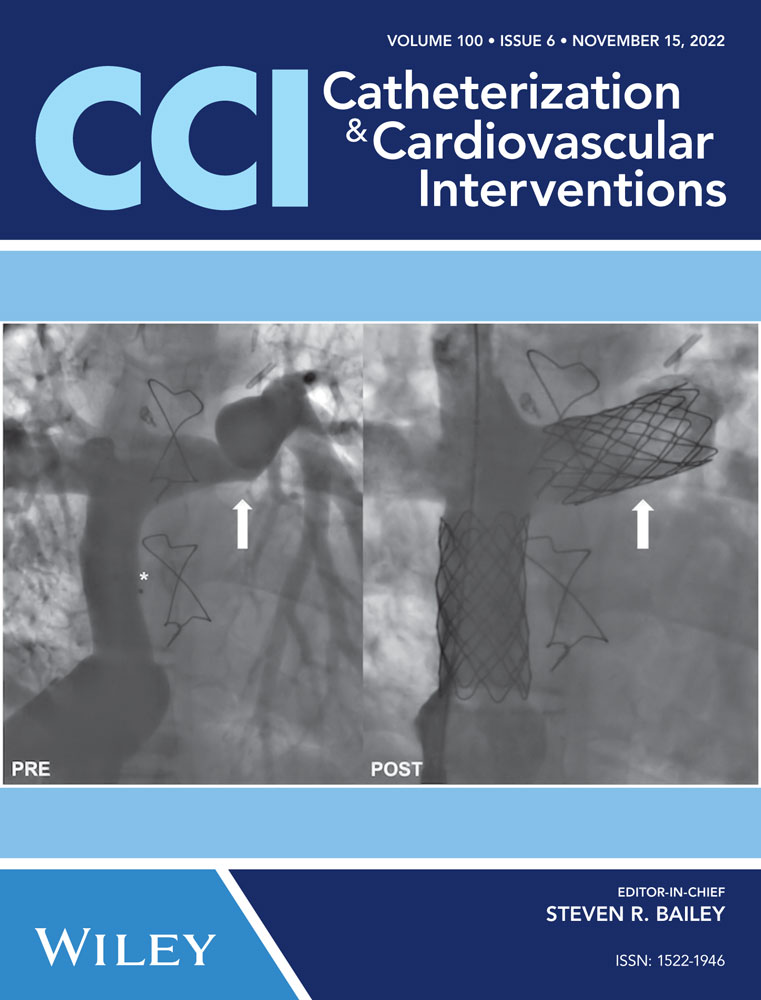Gender differences in chronic total occlusion percutaneous coronary interventions: Insights from the PROGRESS-CTO registry
Abstract
Background
There are limited data describing gender differences in patients undergoing chronic total occlusion (CTO) percutaneous coronary interventions (PCI).
Methods
We compared baseline clinical and angiographic characteristics and procedural outcomes between men and women among 9457 CTO PCIs performed at 38 centers between 2012 and 2022.
Results
A total of 7687 (81%) men and 1770 (19%) women were treated. Women were older, more likely to have comorbidities such as diabetes, hypertension and peripheral arterial disease, and had higher left ventricular ejection fraction. The most common CTO target vessel was the right coronary artery for both men (53%) and women (52%), although the left anterior descending artery was more frequently the target vessel among women (31% vs. 25%; p < 0.001). The J-CTO score (2.4 ± 1.3 vs. 2.2 ± 1.2; p < 0.001) as well as the PROGRESS-CTO score (1.3 ± 1.0 vs. 1.1 ± 1.0; p < 0.001) were higher among men. In female patients, antegrade wiring was more frequently the initial crossing strategy (87.6% vs. 82.4%; p < 0.001) and was more successful in crossing the target lesion (62.7% vs. 54.0%; p < 0.001) compared with men. Interventions in men required longer procedure time and fluoroscopy time, as well as higher air kerma radiation dose and contrast volume when compared to women. Technical (89% vs. 86%; p < 0.001) and procedural (87% vs. 84%; p = 0.003) success rates were higher among women. In-hospital major adverse cardiovascular events (MACE) were also higher in women (2.9% vs. 1.8%; p < 0.001).
Conclusions
Women undergoing CTO PCI had higher technical and procedural success rates, but also higher in-hospital MACE compared with men.
CONFLICTS OF INTEREST
Dr. Alaswad: consultant and speaker for Boston Scientific, Abbott Cardiovascular, Teleflex, and CSI. Dr Basir: consultant for Abbott Vascular, Abiomed, Cardiovascular Systems, Inc (CSI), Chiesi, and Zoll. Dr. Davies: speaking honoraria from Boston Scientific, Medtronic, Siemens Healthineers and Shockwave medical. Dr. Khatri: personal honoria for proctoring and speaking: Abbott Vascular, Asahi Intecc, Terumo, Boston Scientific. Dr. ElGuindy: Consulting Honoraria: Medtronic, Boston Scientific, Asahi Intecc, Abbott; Proctorship fees: Medtronic, Boston Scientific, Asahi Intecc, Terumo; Educational grants: Medtronic. Dr. Abi-Rafeh: proctor and speaker honoraria from Boston Scientific and Abbott Vascular. Dr. Brilakis: consulting/speaker honoraria from Abbott Vascular, American Heart Association (associate editor Circulation), Amgen, Asahi Intecc, Biotronik, Boston Scientific, Cardiovascular Innovations Foundation (Board of Directors), ControlRad, CSI, Elsevier, GE Healthcare, IMDS, InfraRedx, Medicure, Medtronic, Opsens, Siemens, and Teleflex; research support: Boston Scientific, GE Healthcare; owner, Hippocrates LLC; shareholder: MHI Ventures, Cleerly Health, Stallion Medical. All other authors: nothing to disclose.
Open Research
DATA AVAILABILITY STATEMENT
Research data are not shared.




